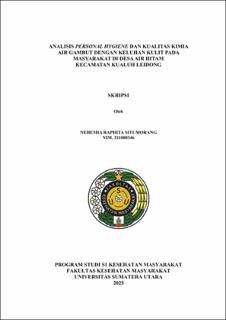| dc.description.abstract | Skin diseases are among the most common health problems in tropical countries, including Indonesia. The high prevalence of skin diseases is influenced by factors such as personal hygiene and poor water quality. In Air Hitam Village, the groundwater used by the community originates from peat water, which is contaminated by oil palm plantation areas. This groundwater serves as the primary source for daily needs due to limited access to clean water. The water tends to be acidic and contains high levels of iron (Fe) and manganese (Mn), which can trigger skin problems. The risk is further increased by poor personal hygiene practices within the community. This study aimed to analyze the relationship between personal hygiene, the chemical quality of peat water, and skin complaints among residents of Air Hitam Village, Kualuh Leidong Subdistrict. This research employed a descriptive design. A total of 100 respondents were selected using purposive sampling. The findings showed that 58% (58 respondents) practiced good personal hygiene, while 42% (42 respondents) had poor personal hygiene. Meanwhile, 59% (59 respondents) reported experiencing skin complaints, whereas 41% (41 respondents) did not. Based on water quality analysis following Ministry of Health Regulation No. 2 of 2023, out of six wells examined, three did not meet pH standards, one exceeded Fe limits, and all six exceeded Mn limits. The majority of respondents (82%) used bore wells, while 18% used dug wells. Furthermore, 86% of respondents used untreated well water, 9% filtered the water before use, and 5% allowed the water to settle prior to use. It is recommended that the community treat well water before daily use and maintain proper personal hygiene to reduce the risk of skin problems. | en_US |


